Corpus Christi Blog
Keeping His Word by Him Dwelling in Us
05-26-2019HomiliesFr. Chad KingTwo weeks ago, in the Gospel John chapter 10, we heard Jesus use the analogy of sheep and Shepherd, saying that His sheep hear his voice. And last week Deacon preached about what it means to love one another as God loves us, which Christ commands us to do. Today, the two ideas are tied together for us. I remind you of that as our 1st verse in today’s Gospel summarized the two points: “Jesus said to his disciples, whoever loves me will keep my word”. Those who really love Jesus will ‘keep his word’. What does it mean to keep his word? To keep his word means to listen and obey all that He has said. Of course, to listen and obey what Jesus says, we first have to hear his voice. Our Gospel goes on to say that the Holy Spirit “will teach you everything and remind you of all that I told you”. Wow, I know that we all desire to know and love Jesus, so let’s take a moment and evaluate ourselves and let the Holy Spirit remind us all that Jesus said. Do you know all that Jesus said? Do you read the Scriptures regularly? Or do you only hear what is proclaimed if you come to Mass on Sundays? Are you keeping his teaching close to your heart, by remembering what was said minutes, hours, days later? Again, if we really love Jesus not only will we know what He said but also strive constantly do what He commanded.
READ MORE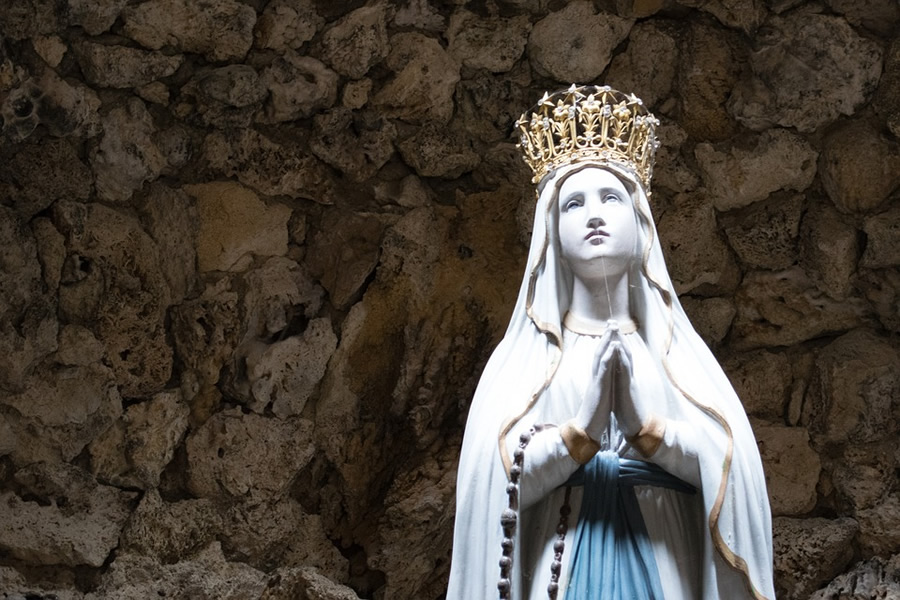
The Star of the Immaculate
05-26-2019Weekly ReflectionLast week, in our 33 Days to Morning Glory journey, we walked with St. Maximilian Kolbe as we learned about Mary as the “Immaculata” — the Immaculate Conception. Here are pictures from the Adoration Chapel at the Center of Prayer for Peace in Niepokalanów, Poland where the monastery that St. Maximilian founded is located.
The central part of the altar is a true size sculpture of the Virgin Mary with her hands open in invitation. Christ present in the Eucharist is located under Mary's heart, in a large, brightly lit Host, shown under her parting coat. The silver figure of the Virgin Mary is surrounded by true size silver lilies, symbolizing chastity. Lit from beneath, together with golden rays also surrounding the figure, they present the aureola of light, in which the Virgin was seen during her apparitions in Lourdes, Guadalupe, and Fatima. This figure also resembles the Miraculous Medal of Mary Immaculate, which was venerated by St. Maximilian. At the crystal layer, 12 cut gemstones are placed, symbolizing 12 stars from the Apocalypse of St. John, which are also pictured at the Niepokalanów Miraculous Medal of Mary Immaculate.
READ MORE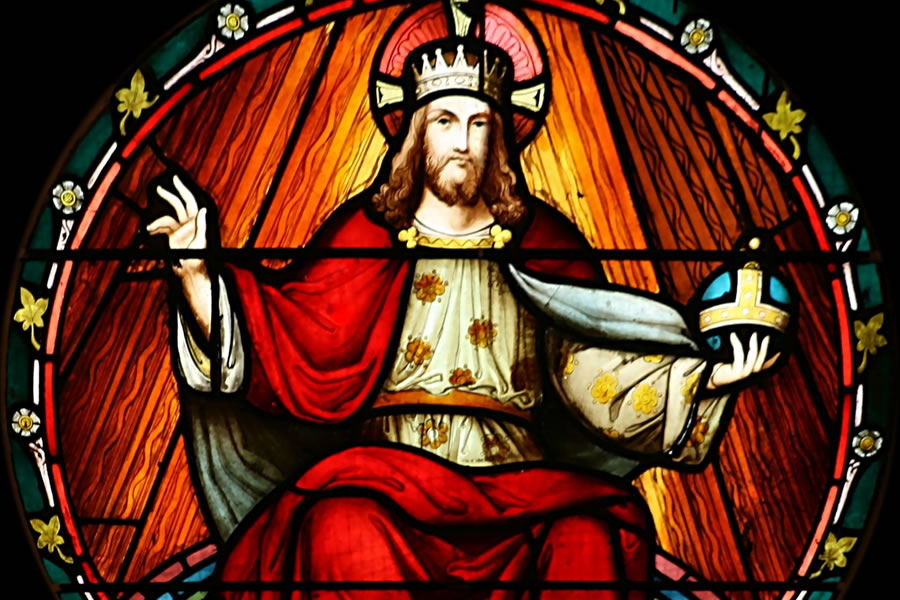
Jesus, the Divine Physician
05-19-2019What's Your Story?Parishioner Carolyn BonarIt was a couple of days before Christmas in 2013 that I fell and broke my right shoulder in two places. As a result of the fall, I also tore my ulnar nerve in my right arm. The ulnar nerve services feeling in approximately half the hand. My two last fingers and the side of my hand had no feeling. What I did experience was severe nerve pain and burning. After six weeks in a sling and then six weeks of rehab for my shoulder, I finally was able to have surgery to reattach my nerve. After surgery, the doctor told me that some people see immediate relief and some may take a year or some may never get any relief. Several weeks went by and I had no relief from the burning nerve pain and still no feeling in my fingers and side of my hand. The pain was unrelenting. Being right-handed, I couldn’t write any more as well.
READ MOREGood shepherd Sunday
05-12-2019HomiliesFr. Chad KingOur Gospel begins: “My sheep hear my voice”. Let’s pause right there. We hear many voices- the voice of Alexa, the voice of the annoying GPS lady which tells she has to ‘recalculate’ when we miss a turn or go the wrong way. When I get ready in the morning, a voice reads to me the Office of Readings. But we know that the voice is not real- the GPS lady really doesn’t know where we are, it’s the satellite that is telling her. And the voice that reads to me the morning prayers, really doesn’t know what it’s reading as there are many mispronounced words- especially in Latin.
The question is do we treat God as that kind of voice? Treat like God is distant, not really knowing where we are or who we are? And so we so often don’t really try to hear God’s voice.
READ MORERenovation Update #1
05-10-2019RenovationOn Thursday, March 14 and Sunday, March 17, parishioner input meetings were held to introduce our architect, provide an update on the project, share initial renovation ideas, and - most importantly - receive input from parishioners. The three meetings had a total of about 60 parishioners and we were able to form Parish Center Design Committee with six members in addition to a few staff.
On Friday, May 10, several members of the Parish Center Design Committee traveled to a couple of other parishes in the Valley to see their parish center/hall to see their set up and gain more inspiration for what might work in our Parish Center.
Consecration invite #2
05-05-2019HomiliesFr. Chad KingLast week on the Feast of Divine Mercy, I invited you to join me and your fellow parishioners to Consecrate yourselves, and our Parish to Jesus through Mary using the 33 days to Morning Glory Consecration. I shared with you the true story of Mary imploring people to conversion and her being so influential in the world in order to lessen and prevent evils, like Communism. I talked about how Our Lady is credited with preventing the bullet from killing her servant, John Paul II, and how she inspired and used John Paul II to spread Jesus’ message of God’s unbounded mercy. We will see in week 4 of the Morning Glory Consecration how John Paul II consecrated himself to Mary, in fact his Papal Motto was Totus Tuus- meaning ‘totally yours’. Did you know it was Mary who was the catalyst behind the holiness and legacy of now St. John Paul II? Did you know Mary was and wants to be so active in the world in preventing evils and bringing about God’s will? Have you ever wondered how much closer to God you could be if you and I would intentionally let her guide us? That’s what the Consecration is all about- letting her lead us even closer to her son Jesus and God’s will for our lives than we ever could on our own.
READ MORE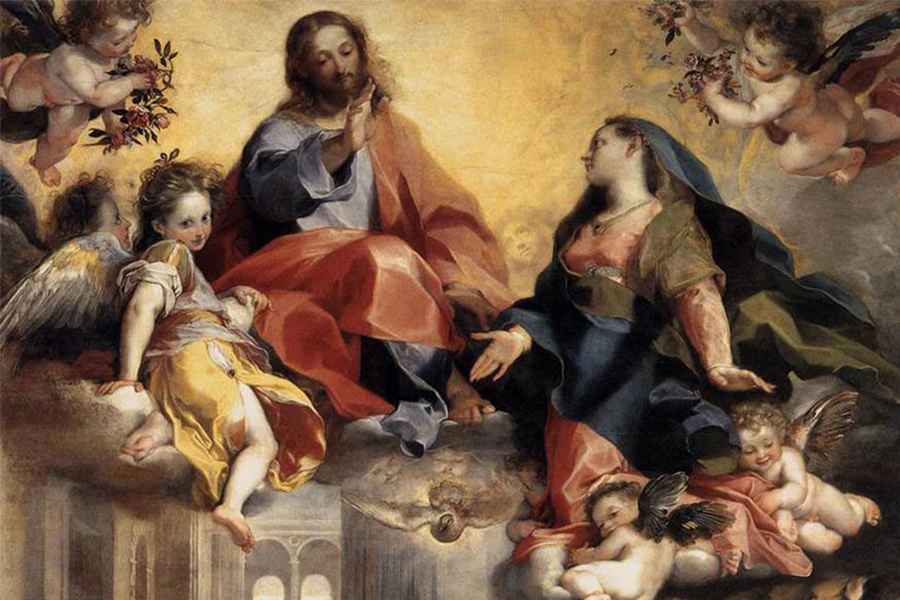
Consecration to Jesus through Mary
05-05-2019Weekly ReflectionMay is the month of Mary and as Fr. Chad mentioned in his homily last Sunday, Bishop Olmsted has asked at least 100,000 Catholics and all parishes in our diocese to be consecrated to Jesus through Mary in celebration of the 50th Anniversary of the Diocese of Phoenix. Our parish will be using materials from Fr. Michael Gaitley’s 33 Days to Morning Glory. Do not worry if you missed the introduction session this past Thursday, as you can still participate. The 33 days will begin this Thursday, May 9 and all are invited to the Parish Center at 7 pm on each Thursday through June 6 for a video and discussion session corresponding to the weekly material. The consecration will take place on Monday, June 10, which is the day after Pentecost and the new feast of The Blessed Virgin Mary, the Mother of the Church.
At the Jubilee of Bishops on Sunday, October 8, 2000, Pope St. John Paul II led the bishops of the world in the following prayer which beautifully explains the meaning of consecration.
READ MORE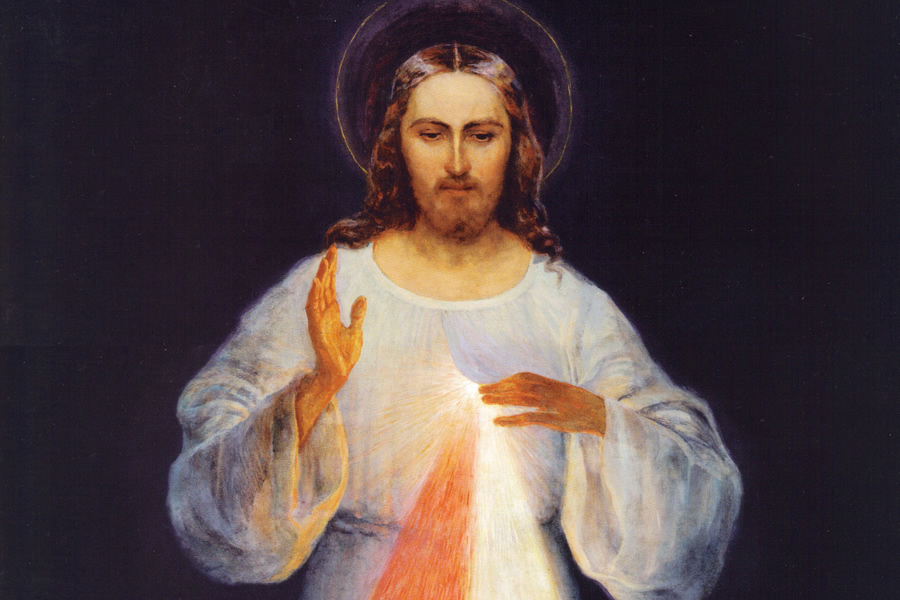
Divine Mercy Sunday
04-28-2019Weekly ReflectionIn entry 699 of St. Maria Faustina’s Diary, Jesus instructed her:
My daughter, tell the whole world about My inconceivable mercy. I desire that the Feast of Mercy be a refuge and shelter for all souls, and especially for poor sinners. On that day the very depths of My tender mercy are open. I pour out a whole ocean of graces upon those souls who approach the fount of My mercy. The soul that will go to Confession and receive Holy Communion shall obtain complete forgiveness of sins and punishment. On that day all the divine floodgates through which grace flow are opened. Let no soul fear to draw near to Me, even though its sins be as scarlet. My mercy is so great that no mind, be it of man or of angel, will be able to fathom it throughout all eternity. Everything that exists has come forth from the very depths of My most tender mercy. Every soul in its relation to Me will contemplate My love and mercy throughout eternity. The Feast of Mercy emerged from My very depths of tenderness. It is My desire that it be solemnly celebrated on the First Sunday after Easter. Mankind will not have peace until it turns to the Fount of My Mercy.
READ MOREConsecration and Divine Mercy
04-28-2019HomiliesFr. Chad KingYou may or may not know, the Diocese of Phoenix is currently celebrating our 50th anniversary. To celebrate the past 50 years of blessings in gratitude, and to assure continued blessings and growth for years to come, Bishop Olmsted would like at least 100,000 Catholics in the Diocese to Consecrate themselves to Jesus through Mary, but also strongly encourages parishes to consecrate themselves. As your pastor, I would greatly like our parish to be one of those parishes, not only for the good of the Diocese, but so that we can be lead to become the Corpus Christi we are meant to be. Personally, I first consecrated myself when I was in college using St. Louis de Montfort’s Consecration. But a couple of years ago I consecrated myself to Jesus through Mary using Fr. Gaitley’s Consecration, which personally I find more inspiring. For those who don’t know, Fr. Gaitley describes 4 Saints- St. Louis de Montfort, St. Maximillian Kolbe, St. Mother Teresa, and St. Pope John Paul II- all who have all had a special devotion to Jesus through our Blessed Mother. As a parish we’ll have an introduction on this Thursday, May 2, especially if you haven’t Consecrated yourself in the past, and the 33 days of daily reading and praying will begin Thursday, May 9. You can purchase your own book to have for your own to renew each year, or we’ll give you a free handout to help lead you through the Consecration. In addition, we’ll meet each week on Thursday evenings, for those who can, to watch the video and discuss what we have read about that Saint’s devotion through Mary. Finally, we will Consecrate ourselves on Monday, June 10- the Feast of Mary, Mother of the Church- the Monday after Pentecost. Then we will reap the blessings.
READ MORE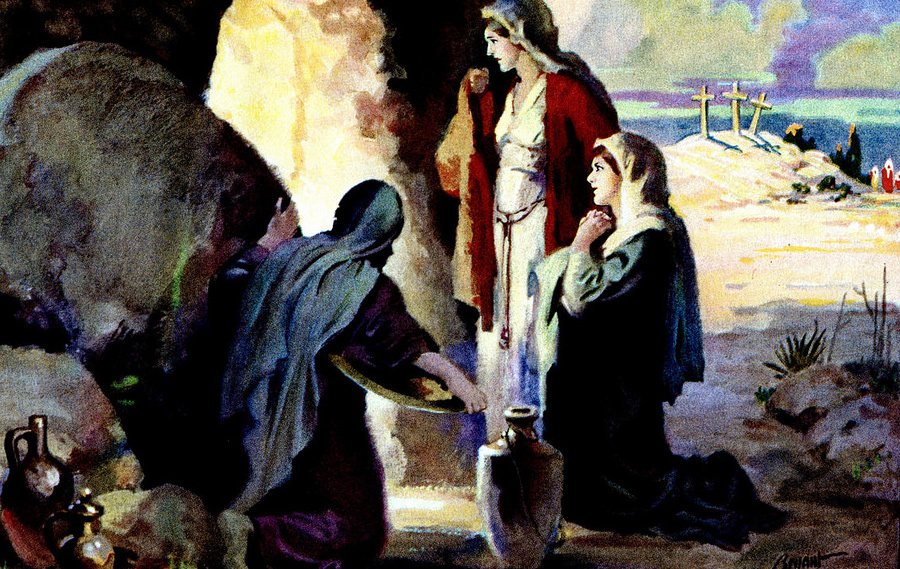
Happy Easter Everyone! Christ is Risen, Alleluia!
04-21-2019Weekly ReflectionFr. Chad KingThe other day, I was talking to somebody about Jesus Christ and how some people don’t truly know or believe in who He really is, the Son of God. I asked if she had ever noticed why, especially in the Gospel of Mark, that many times after Jesus healed someone and after the Transfiguration, Jesus told his disciples not to tell anyone about who He is or what He did. Theologians say that Jesus knew that God the Father’s plan for what it meant to be the Messiah and Savior, was different than what the Jewish people of the time had in mind. In Mark’s Gospel especially, one cannot really know or believe in who Jesus is until after the Resurrection. God’s plan for salvation included suffering, death, and the resurrection from the dead. Therefore, what a difference the Resurrection makes, or should make in our lives.
READ MORE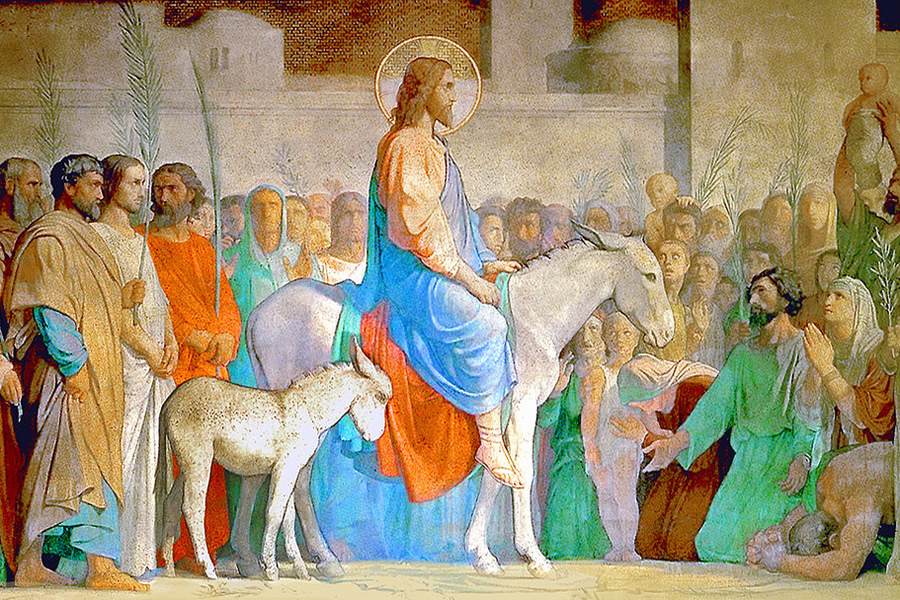
A Place for You in Heaven
04-14-2019Weekly ReflectionJen Arnold, MA Theology & CatecheticsNow that we’re at the end of Lent and have reflected on sin, virtue, suffering, and prayer, we may ask ourselves, “What is the ultimate point of all of this?” Certainly, we are all aware that our goal is to get to Heaven. But did you know that there are different degrees of Heaven and that we can actually merit a higher degree of heaven by increasing our holiness through our virtuous nature?
Before we get into that, let’s first see how the Catholic Church actually defines the basics of Heaven.
READ MORE
The Role of Prayer in Our Pursuit of Holiness
04-07-2019Weekly ReflectionJen Arnold, MA Theology & CatecheticsWe spent the first few weeks of Lent looking at how we can grow in virtue in order to overtake the darkness of sin in our lives. We can consciously engage our intellect and will to actively choose virtuous behaviors and attitudes which direct us toward holiness. However, despite our human engagement, we can’t forget one very important thing: we cannot do anything good but by the grace of God. To think otherwise would be to suffer from the sin of pride, making our virtuous behavior inauthentic. In order to receive His outpouring of grace we need to be in constant and intimate relationship with Him through prayer. It is prayer that sustains our pursuit of holiness.
READ MORE